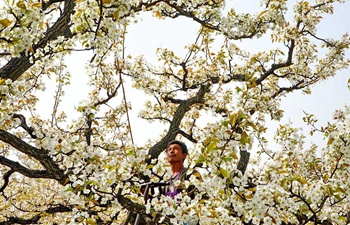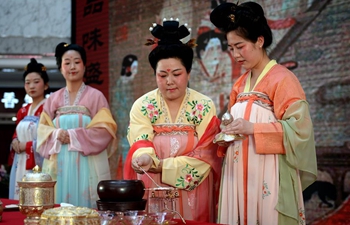CHANGSHA, April 19 (Xinhua) -- Zhang Tianshun, 54, was not accustomed to the huge kitchen in the starred hotel. For the past several decades, he has cooked his tea dishes behind a firewood stove in his home village.
He has developed 25 original dishes featuring the fresh tea leaves grown in Aikou Village in central China's Hunan Province. On Saturday, he served six of them, including trotters, tofu soup and pastries, to over 200 guests from all over China.
The meal at the hotel was part of a promotional event by the local government to encourage rural tourism.
Aikou is famous for its green tea leaves, but the prosperity brought by the tea trade, which dated back to the 14th century, disappeared with the decline of the ancient "tea road." Over 95 percent of villagers lived below the poverty line when China's reform and opening-up began 40 years ago.
Zhang's favorite memory from childhood is eating the tea meals cooked by his grandparents, which used tea leaves picked in early April from four wild tea trees around their home.
"Tea leaves can dilute oily tastes. Villagers, who were poor and always hungry at the time, never thought of drinking tea," he said. But the dishes with tea leaves were surprisingly delicious.
Zhang's family couldn't afford seasoning or cooking oil most of the time. So his father boiled dried tea leaves with tofu and fried duck eggs with them.
Introducing these family recipes to more people had long been a goal for Zhang. In 2003, he opened the first tourist restaurant in his village. However, due to poor infrastructure and management, rural tourism failed to flourish as expected. Zhang's restaurant closed down within just three years.
However, his dream was rekindled by Xiang Tianshun, now the village chief. In 2009, Xiang resigned from his job as a civil servant in the township government, and returned to Aikou to develop tea-related industries.
Under his leadership, the cultivation area of tea leaves expanded 30 times to 270 hectares in three years. In 2012, the local government also invested heavily in the tea industry, adding another 400 hectares of tea trees. More than half of villagers have escaped poverty through tea-related industries.
Zhang was again immersed in his tea meal business. Last year, his restaurant reopened. Tourists flocked to have a taste of Zhang's unique tea cuisine.
"With facilities such as tea-themed parks and guesthouses, tourists now can have a good time eating, playing and staying at tea plantations. In addition, there are tea leaf pillows, teaware and other souvenirs to take home," said Liu Xiaohua, director of the local poverty relief office.

















